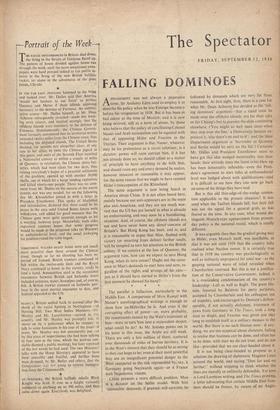Portrait of the Week— T HE RACIAL DISTURBANCES in Britain died
down; the firing in the Straits of Formosa flared up. The pattern of house divided against house can through the week, until the more sensational news- ' papers were hard pressed indeed to fan public in- terest in the firing of the new British ballistic rocket, let alone in the adventures of the giant panda, Chi-chi.
*
IN THE FAR EAST, everyone hastened to the brink and looked over. Mr. Dulles said that America 'would not hesitate to use force' to protect Quemoy and Matsu if these islands appeared necessary to the defence of Formosa. An authori- tative source—Mr. Dulles himself, as Mr. Dean Acheson subsequently revealed—made this warn- ing even clearer, and implied strongly that the offshore itlands were necessary to the defence of Formosa. Simultaneously, the Chinese Govern- ment formally announced that its territorial waters extended twelve miles from the Chinese coast, thus including the disputed islands. The United States decided, for reasons not altogether clear, at any rate to her allies, to twist the Chinese pigtail at this point, and units of the Seventh Fleet escorted a Nationalist convoy to within a couple of miles of Quemoy; in retaliation, the Chinese shore bat- teries, which had been silent for two days, thus raising everybody's hopes of a peaceful settlement of the problem, opened up with another 50,000 shells, one of which hit a barge landing explosives and killed ninety-one people. There was no com- ment from Mr. Dulles on the success of the escort system, nor was any needed, for on the following day Mr. Khrushchev joined in with a letter to President Eisenhower. This spoke of blackmail and intimidation, declared that there could be no peace in the area until United States forces were withdrawn, and added for good measure that the Chinese guns were quite accurate enough to hit a warship, however large. Meanwhile, both sides expressed cautious hopes that some progress would be made at the proposed talks (in Warsaw) at ambassadorial level, and the usual jockeying for position round the table began.
*
TERRITORIAL WATERS nearer home were not much more peaceful than those around the Chinese coast, though so far no shooting has been re- ported off Iceland. British trawlers continued to fish within the twelve-mile limit and the Royal Navy continued to hover in the vicinity, ready to lend a hand, Ammunition used in the occasional encounters between British and Icelandic boats included potatoes, water, hosepipes and, of course, fish. A British trawler rammed an Icelandic gun- boat 111 the most martial encounter to date, and Iceland appealed to the UN.
*
SLOWLY, Britain settled back to normal "after the shock of the racial lighting in Nottingham :•nd Notting • Hill. Two West Indies ' Ministers—Mr. Manley and Mr. Lacorbiniere—arrived in this country, and Mr. Manley was promptly told to move on by a policeman when he stormy' to talk to some Jamaicans in his tour of the trouW td areas. Mr. Manley was not unnaturally put oat by this piece of impertinence (he had been talking to four men at the time, which the zealous con- stable deemed a public meeting), but later repented of the hot words he had used. The two Ministers' talks with the Home Secretary appeared to have been amicable and fruitful, and further hints were dropped, by Mr. Butler and others, that the Goveilimeilt v..ac not going to restrict, immigra-
tion front the Coinonwealth. '
*
AT WOOMERA, the British ballistic missile Black Knight was fired. It rose to a' height variously estimated Ri anything up to 300 miles, and then came down again. Everybody was delighted.


































 Previous page
Previous page